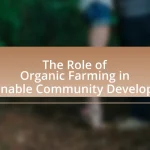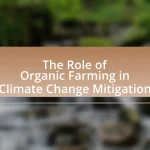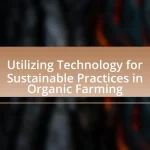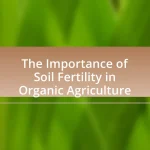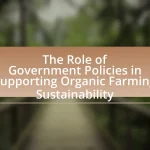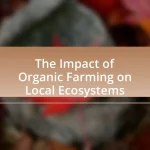Organic certification is a verification process that ensures agricultural products are produced according to specific standards, prohibiting synthetic pesticides, fertilizers, and genetically modified organisms. This certification is vital for promoting sustainable practices, enhancing soil health, conserving water, and reducing pollution. The article explores how organic certification contributes to sustainability through improved biodiversity, soil management, and reduced greenhouse gas emissions. It also examines the economic benefits for farmers, including access to premium markets and higher prices for organic products, as well as the social implications that support community well-being and fair labor practices. Additionally, the article addresses the challenges farmers face in obtaining certification and offers practical steps to maintain compliance with organic standards.
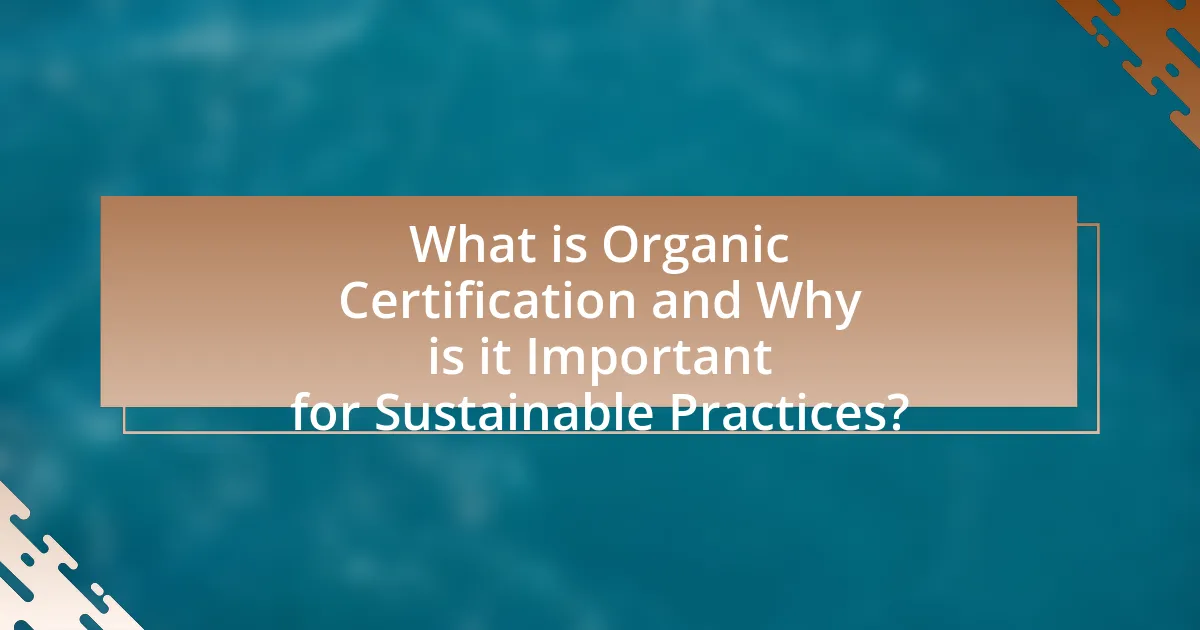
What is Organic Certification and Why is it Important for Sustainable Practices?
Organic certification is a process that verifies that agricultural products are produced according to specific standards set by regulatory bodies, ensuring they are grown without synthetic pesticides, fertilizers, or genetically modified organisms. This certification is crucial for sustainable practices as it promotes environmentally friendly farming methods that enhance soil health, conserve water, and reduce pollution. According to the USDA, organic farming practices can lead to improved biodiversity and ecosystem health, which are essential for long-term agricultural sustainability.
How does Organic Certification contribute to sustainability?
Organic Certification contributes to sustainability by promoting agricultural practices that enhance soil health, reduce chemical inputs, and support biodiversity. This certification ensures that farming methods prioritize ecological balance, which leads to improved water quality and reduced pollution. For instance, organic farming techniques, such as crop rotation and composting, help maintain soil fertility and structure, which are essential for sustainable agriculture. According to the USDA, organic farming can reduce greenhouse gas emissions by up to 40% compared to conventional methods, demonstrating its significant role in mitigating climate change.
What are the key principles of organic farming?
The key principles of organic farming include the use of natural inputs, crop rotation, biodiversity, and soil health management. Organic farming emphasizes the avoidance of synthetic fertilizers and pesticides, promoting ecological balance and sustainability. For instance, the USDA National Organic Program outlines that organic farming practices must enhance soil fertility and biodiversity, which are essential for maintaining healthy ecosystems. Additionally, organic farmers often implement crop rotation to prevent pest buildup and improve soil structure, further supporting the principles of sustainability and environmental stewardship.
How does organic certification differ from conventional farming practices?
Organic certification differs from conventional farming practices primarily in its prohibition of synthetic pesticides and fertilizers. Organic farming relies on natural substances and processes, promoting biodiversity and soil health, while conventional farming often utilizes chemical inputs to enhance crop yields. According to the USDA, organic standards require that crops be grown without the use of synthetic chemicals, genetically modified organisms, or irradiation, ensuring a more environmentally sustainable approach. This distinction highlights the commitment of organic farming to ecological balance and the reduction of chemical runoff, which can harm ecosystems and water quality.
What are the environmental benefits of Organic Certification?
Organic Certification provides significant environmental benefits by promoting sustainable agricultural practices that enhance biodiversity, improve soil health, and reduce pollution. Specifically, organic farming methods avoid synthetic pesticides and fertilizers, which minimizes chemical runoff into waterways, thereby protecting aquatic ecosystems. Research indicates that organic farms support higher levels of biodiversity, with studies showing that they can host up to 30% more species compared to conventional farms. Additionally, organic practices such as crop rotation and cover cropping improve soil structure and fertility, leading to better water retention and reduced erosion. These practices contribute to carbon sequestration, helping to mitigate climate change. Overall, Organic Certification fosters a healthier ecosystem and promotes sustainable land use.
How does organic farming impact soil health?
Organic farming significantly enhances soil health by promoting biodiversity, improving soil structure, and increasing organic matter content. This farming method utilizes practices such as crop rotation, cover cropping, and the application of organic fertilizers, which contribute to a more resilient soil ecosystem. Research indicates that organic soils typically have higher levels of microbial activity and nutrient availability compared to conventionally farmed soils, leading to improved fertility and reduced erosion. A study published in the journal “Agriculture, Ecosystems & Environment” found that organic farming can increase soil organic carbon levels by 20-30% over time, demonstrating its positive impact on soil health.
What role does organic certification play in biodiversity conservation?
Organic certification plays a crucial role in biodiversity conservation by promoting agricultural practices that enhance ecosystem health and protect various species. Organic farming methods, which prohibit synthetic pesticides and fertilizers, encourage the use of natural inputs and crop rotations, leading to improved soil quality and habitat diversity. Research indicates that organic farms typically support higher levels of biodiversity compared to conventional farms; for instance, a study published in the journal “Agriculture, Ecosystems & Environment” found that organic farms can host up to 30% more species of plants and animals. This increase in biodiversity contributes to ecosystem resilience, pest control, and pollination, ultimately supporting sustainable agricultural practices.
How does Organic Certification affect consumer choices?
Organic certification significantly influences consumer choices by increasing trust in product quality and safety. Consumers often perceive organic products as healthier and more environmentally friendly, leading to a preference for these items over conventional alternatives. Research indicates that 76% of consumers are willing to pay more for organic products, reflecting a strong demand driven by the certification’s assurance of adherence to specific agricultural practices. Additionally, a study published in the Journal of Consumer Research found that organic labeling enhances perceived value, which directly impacts purchasing decisions. This correlation between organic certification and consumer behavior underscores the importance of certification in shaping market trends and preferences.
Why do consumers prefer organic products?
Consumers prefer organic products primarily due to health benefits and environmental concerns. Research indicates that organic products often contain fewer pesticides and chemicals, which appeals to health-conscious individuals. A study published in the British Journal of Nutrition found that organic produce has higher antioxidant levels, contributing to better health outcomes. Additionally, consumers are increasingly aware of the environmental impact of conventional farming, leading them to choose organic options that promote sustainable agricultural practices. This preference is supported by data from the Organic Trade Association, which reported a consistent increase in organic product sales, reflecting a growing consumer demand for healthier and more environmentally friendly choices.
How does organic labeling influence purchasing decisions?
Organic labeling significantly influences purchasing decisions by enhancing consumer trust and perceived value. Research indicates that consumers are more likely to choose products labeled as organic due to the association with health benefits, environmental sustainability, and ethical farming practices. A study published in the Journal of Consumer Research found that 70% of consumers are willing to pay a premium for organic products, reflecting a strong preference for items perceived as healthier and more environmentally friendly. This preference is driven by the belief that organic labeling signifies higher quality and safety, leading to increased sales for certified organic products.

What are the Economic Benefits of Organic Certification?
Organic certification provides economic benefits by enabling farmers to access premium markets, resulting in higher prices for organic products. Research indicates that organic produce can sell for 20% to 100% more than conventional counterparts, significantly increasing farmers’ income. Additionally, organic certification can lead to reduced input costs over time, as organic practices often rely on natural pest control and soil health, decreasing the need for synthetic fertilizers and pesticides. A study by the USDA found that organic farms typically have lower production costs due to these sustainable practices. Furthermore, organic certification can enhance brand loyalty and consumer trust, leading to increased sales and market share for certified producers.
How does Organic Certification impact market access for farmers?
Organic certification significantly enhances market access for farmers by allowing them to sell their products at premium prices in both domestic and international markets. This certification meets consumer demand for organic products, which has been steadily increasing; for instance, the organic food market in the United States reached approximately $62 billion in 2020, reflecting a 12.4% growth from the previous year. Furthermore, organic certification opens doors to specialized markets, such as health food stores and organic cooperatives, which often require verified organic status for product inclusion. This access not only increases sales opportunities but also fosters long-term relationships with retailers and consumers who prioritize sustainability and health.
What are the financial incentives for farmers to obtain organic certification?
Farmers obtain organic certification primarily to access premium pricing for their products. Organic produce typically commands higher market prices, with studies indicating that organic fruits and vegetables can sell for 20% to 100% more than their conventional counterparts. Additionally, organic certification can open up new market opportunities, such as access to health food stores and specialty markets that prioritize organic products. Furthermore, certified organic farms may qualify for government subsidies and grants aimed at promoting sustainable agricultural practices, enhancing their financial viability. These financial incentives collectively encourage farmers to invest in organic certification, leading to increased profitability and market competitiveness.
How does organic certification affect pricing strategies?
Organic certification typically leads to higher pricing strategies for products due to increased production costs and consumer willingness to pay a premium for organic goods. The certification process involves rigorous standards, which often result in higher expenses for farmers and producers, including costs for organic inputs, certification fees, and compliance with regulations. Research indicates that organic products can command prices that are 20% to 100% higher than their conventional counterparts, reflecting consumer demand for perceived quality and health benefits. This premium pricing strategy is supported by market studies showing that consumers are increasingly prioritizing organic options, thus allowing certified products to maintain higher price points in competitive markets.
What are the challenges associated with obtaining Organic Certification?
Obtaining Organic Certification presents several challenges, including compliance with stringent regulations, the need for extensive documentation, and the financial burden of certification fees. Farmers and producers must adhere to specific organic standards set by regulatory bodies, which often require detailed records of farming practices, inputs, and processes. Additionally, the certification process can be time-consuming, often taking several months to complete, which can delay market access. Financially, the costs associated with certification, including application fees and potential investments in organic farming practices, can be significant, particularly for small-scale producers. These challenges can deter some from pursuing organic certification despite its benefits for sustainable practices.
What are the common barriers for farmers seeking certification?
Common barriers for farmers seeking certification include high costs, complex regulations, and lack of access to information. The financial burden of certification fees, compliance costs, and potential loss of income during the transition period can deter farmers. Additionally, the intricate and often confusing regulatory requirements can overwhelm those unfamiliar with the certification process. A study by the USDA found that 30% of farmers cited financial constraints as a primary obstacle, while 25% reported difficulties in understanding the certification standards. These factors collectively hinder farmers from pursuing organic certification, despite its potential benefits for sustainable practices.
How can farmers overcome these challenges?
Farmers can overcome challenges related to organic certification by adopting comprehensive training programs and utilizing technology for better resource management. Training programs enhance farmers’ understanding of organic practices, pest management, and soil health, which are crucial for meeting certification standards. For instance, the USDA offers resources and workshops that help farmers navigate the certification process effectively. Additionally, technology such as precision agriculture tools can optimize inputs and improve yields, making it easier for farmers to comply with organic regulations. Research indicates that farms using precision agriculture techniques can increase productivity by up to 20%, thereby supporting sustainable practices while achieving certification.

What are the Social Implications of Organic Certification?
Organic certification has significant social implications, primarily by promoting sustainable agricultural practices that enhance community well-being. This certification fosters social equity by supporting small-scale farmers, who often benefit from higher prices for organic products, thus improving their livelihoods. According to the USDA, organic farming can lead to increased employment opportunities in rural areas, as it typically requires more labor than conventional farming methods. Additionally, organic certification encourages community engagement and consumer awareness regarding food production, leading to healthier dietary choices and stronger local economies. Studies have shown that regions with a higher prevalence of organic farms often experience improved social cohesion and community resilience, as these farms frequently engage in local markets and educational initiatives.
How does Organic Certification promote community well-being?
Organic Certification promotes community well-being by fostering local economies and enhancing public health. By supporting organic farming practices, communities benefit from increased access to fresh, chemical-free produce, which contributes to better nutrition and reduced health risks associated with pesticide exposure. Additionally, organic farms often prioritize local sourcing and labor, creating jobs and stimulating economic growth within the community. Research indicates that organic farming can lead to a 30% increase in local economic activity compared to conventional farming methods, thereby reinforcing community ties and resilience.
What role does organic farming play in local economies?
Organic farming significantly contributes to local economies by enhancing agricultural diversity, increasing local employment opportunities, and promoting sustainable practices. This farming method often requires more labor than conventional farming, leading to job creation in rural areas. According to a study by the USDA, organic farms can generate 30% more jobs per acre compared to conventional farms. Additionally, organic farming supports local businesses by creating demand for local inputs and services, which stimulates economic growth within the community. Furthermore, organic products often command higher prices, providing farmers with better income stability and contributing to the overall economic resilience of local agricultural sectors.
How does organic certification support fair labor practices?
Organic certification supports fair labor practices by establishing standards that promote equitable treatment of workers in agricultural settings. These standards often include requirements for fair wages, safe working conditions, and the prohibition of child labor, which are enforced through regular inspections and audits. For instance, the USDA Organic regulations mandate that certified farms adhere to labor laws, ensuring that workers are treated fairly and ethically. This framework not only protects workers’ rights but also encourages transparency and accountability within the organic farming industry, fostering a more sustainable and just agricultural system.
What are the best practices for maintaining Organic Certification?
To maintain Organic Certification, it is essential to adhere to the USDA National Organic Program (NOP) standards consistently. This includes implementing organic farming practices, maintaining detailed records of all inputs and outputs, and ensuring that all products are free from prohibited substances for at least three years prior to harvest. Regular inspections by accredited certifying agents are also required to verify compliance with organic standards. According to the USDA, over 80% of certified organic operations report that maintaining detailed records helps them stay compliant and improves their overall farm management.
How can farmers ensure compliance with organic standards?
Farmers can ensure compliance with organic standards by implementing rigorous record-keeping practices, adhering to specific agricultural methods, and undergoing regular inspections. Maintaining detailed records of inputs, practices, and sales helps demonstrate adherence to organic regulations, which often require documentation of seed sources, pest management, and soil health practices. Additionally, farmers must follow organic farming methods, such as using organic seeds, avoiding synthetic fertilizers and pesticides, and practicing crop rotation. Regular inspections by accredited certifying agents validate compliance with the National Organic Program (NOP) standards, which are enforced by the USDA. These measures collectively ensure that farmers meet the necessary criteria for organic certification, thereby supporting sustainable agricultural practices.
What resources are available for farmers to stay informed about organic practices?
Farmers can access various resources to stay informed about organic practices, including government agencies, educational institutions, and online platforms. The USDA’s National Organic Program provides guidelines and updates on organic standards, while universities often offer extension services that include workshops and research on organic farming techniques. Additionally, organizations like the Organic Farming Research Foundation publish research and resources specifically for organic farmers. Online platforms such as eOrganic provide webinars and articles that cover a wide range of organic farming topics, ensuring farmers have access to the latest information and best practices in organic agriculture.
What practical steps can farmers take to benefit from Organic Certification?
Farmers can benefit from Organic Certification by implementing practices such as transitioning to organic farming methods, maintaining detailed records of inputs and practices, and ensuring compliance with organic standards set by certifying bodies. Transitioning involves adopting organic practices like crop rotation, using organic fertilizers, and managing pests through natural means, which enhances soil health and biodiversity. Maintaining detailed records is crucial for demonstrating compliance during inspections, as it provides transparency and accountability. Compliance with organic standards, which include restrictions on synthetic pesticides and fertilizers, is essential for certification and can lead to higher market prices and access to niche markets. According to the USDA, organic products often sell for 20-100% more than their conventional counterparts, illustrating the financial benefits of certification.

